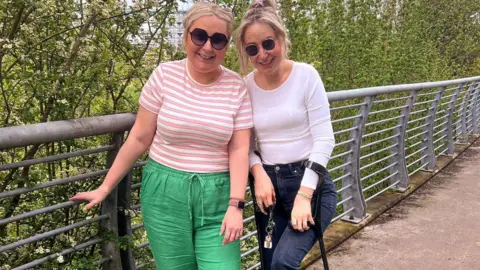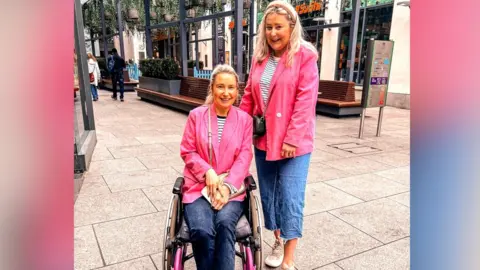The rare disease films raising greater awareness
People with rare diseases in Northern Ireland have been sharing their stories through a series of short films.
There are more than 7,000 known rare conditions worldwide.
It is estimated that more than 110,000 people, or one in 17, are impacted by rare conditions in Northern Ireland.
The Rare Stories project explores a wide range of issues from difficulties in getting diagnosed to tackling stereotypes.
It was created by the Northern Ireland Rare Disease Partnership (NIRDP).
The organisation's chief executive, Patrick Toland, said: "The Rare Stories project is a testament to the resilience and strength of the rare disease community in Northern Ireland.
"We are sharing these emotive and educational stories."
'We have each other'
County Antrim-born twins Lucy Smyth and Zoe Buxton live with a condition considered among the rarest in the world.
At a young age they were diagnosed with Fibrodysplasia Ossificans Progressiva (FOP).
It causes the body's soft tissue to gradually turn to bone, creating a second skeleton that can immobilise them.
It affects about one in two million people worldwide.
Lucy and Zoe are thought to be one of only three sets of twins worldwide who have the debilitating condition.

They both contributed to the Rare Stories project by featuring in a short film.
When I met them both at Zoe's home in Cloughmills, County Antrim, their close bond was obvious.
Zoe told me: "I'm so grateful to have Lucy, she understands what I'm going through. She can drive me mad, but we have each other."
Responding with a smile, Lucy added: "We even had a bit of an argument just before you arrived, but it never lasts long, we're friends again."
For Lucy and Zoe, their every day lives are impacted by their rare disease.
"Whenever we bump our muscles, a mass grows and as we grow older and the condition progresses, you're like a human statue," said Zoe.
"I can't do things like put my own socks on or brush my hair or anything like that, so obviously I have to depend on other people to do that, so it is quite tough," Lucy explained.
 PA Media
PA MediaLucy and Zoe said they were sharing their story as part of the project to address the stigma that still surrounds rare diseases.
"It's really important because people just don't know enough about rare diseases and that sometimes goes for medical professionals as well," Zoe said.
Lucy continued: "We've had times when we've needed hospital treatment and we tell them about our medical condition, and they just don't know anything about it."
Improve lives
Each region of the UK has developed action plans to improve the lives of people living with rare diseases.
One key development in Northern Ireland has been the appointment of an adult and paediatric rare diseases clinical lead consultant post to facilitate better coordination of rare diseases treatment.
In September this year, the Northern Ireland Rare Diseases Implementation Group published its first annual report.

It made recommendations around increased awareness of rare diseases amongst healthcare professionals and improved access to specialist treatment and drugs.
In a statement, the Department of Health said it was "committed to improving the lives of people living with a rare condition in Northern Ireland".
Zoe said: "Things are getting better but it's still hard, you just have to adapt to everything, almost forget that you have this horrible disease and just carry on through life."
The Rare Stories project features 17 short films of people with rare diseases that are available on YouTube.
The project was supported by ESC Films and the Rank Foundation.
